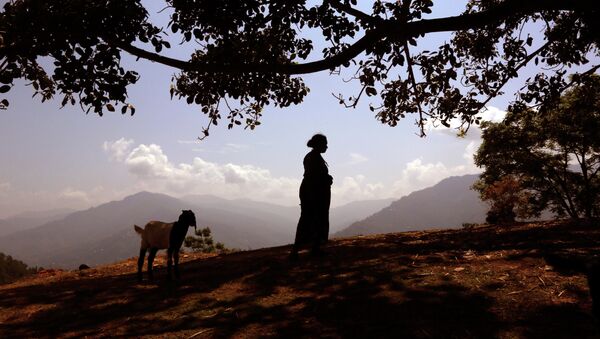Sputnik: Could you please explain why menstruating women are cast away from society and banished in huts for the whole time of their periods?
There are also strict rules around water, which is considered pure in Hinduism. So for example, in a village, women who are menstruating are not allowed to use community water-sources, and they're not allowed to bathe or wash clothes from any communal water-sources throughout the duration of their period. And this practice is not only just done while women are menstruating: it is often practiced when women have just given birth — so when women are bleeding, you know, once they have had their babies, they're also put into these huts, which has inevitably led to deaths of women and their babies, as well.
Sophie Cousins: Exactly. In the winter months, which is now in Nepal, in the Himalayas, in sub-degree temperatures, all they have are straw mats — that's all they're allowed to have — the huts are windowless, and so the only way they can get warm and protect themselves from these freezing temperatures is to light fires inside these huts. And so a number of the women have died from smoke inhalation. Because, like you said, a lack of oxygen.
READ MORE: Nepali Bureaucrat Takes Up Mission to Eradicate Menstruation Huts
Sputnik: The Nepalese government has banned the practice of chhaupadi in 2005 — that's 14 years ago. That's a long time. And yet, these women are still forced to isolate themselves during their menstruation periods. So why is this happening? Is it because it's so rooted in their culture, so they cannot really detached from it anymore? Or is it because it's a patriarchal society, so they still want this to be implemented?
These are in the Far West: when you think about Nepal, these are not regions that you can fly to or that are easily accessible, many of these people are so isolated that, how would people actually be aware of the ban? So it's one thing to have a ban and criminalise a practice in Kathmandu, but it's another to realise it in these far western regions which are so far from Kathmandu, and are so isolated. And, like you said, as well, it's an extremely patriarchal society. Women do not have agency, they are doing what they're told to do, but they're also doing what they believe to be right. So it's going to be really hard to change the practice.
The views expressed in this article are those of the speaker and do not necessarily reflect those of Sputnik.




